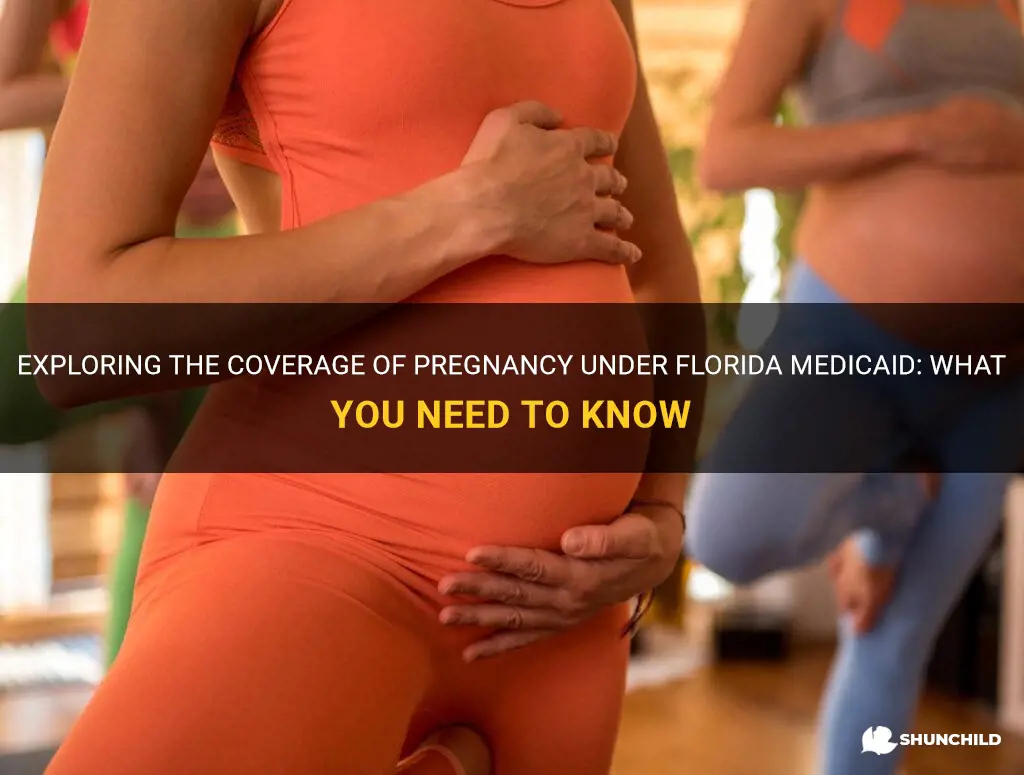
Florida Medicaid is a program that provides healthcare coverage to low-income individuals and families who meet certain eligibility requirements. One of the important aspects of this program is its coverage for pregnancy. In this state, Medicaid offers comprehensive prenatal care and delivery services to pregnant women, ensuring that they receive the medical attention they need to have a healthy pregnancy and delivery. This coverage is essential for expectant mothers who may not have access to private health insurance, as it helps to remove financial barriers and ensures that every woman has the opportunity to receive proper prenatal care, leading to positive maternal and infant health outcomes.
| Characteristics | Values |
|---|---|
| Eligibility | Low-income |
| Income requirements | Varies by program |
| Citizenship | U.S. citizen or qualified alien |
| Residency | Florida resident |
| Pregnancy coverage | Yes |
| Prenatal care | Yes |
| Delivery and postpartum care | Yes |
| Maternity services | Yes |
| Obstetric care | Yes |
| Prescription drugs | Covered |
| Hospitalization | Covered |
| Laboratory services | Covered |
| Preventive services | Covered |
| Emergency services | Covered |
| Behavioral health services | Covered |
| Dental services | Limited coverage |
| Vision services | Limited coverage |
| Transportation | Limited coverage |
| Family planning | Covered |
| Long-term care | Limited coverage |
| Home health services | Limited coverage |
| Nursing facility | Limited coverage |
What You'll Learn
- Does Florida Medicaid provide coverage for prenatal care during pregnancy?
- Are labor and delivery expenses covered by Florida Medicaid?
- Does Florida Medicaid cover postpartum care after giving birth?
- Are prescription medications related to pregnancy covered by Florida Medicaid?
- Does Florida Medicaid provide coverage for ultrasounds and other prenatal diagnostic tests?

Does Florida Medicaid provide coverage for prenatal care during pregnancy?
Florida Medicaid provides coverage for prenatal care during pregnancy. Prenatal care is essential for ensuring a healthy pregnancy and giving the best possible start to both the mother and the baby.
Prenatal care includes a range of medical, nutritional, and educational services that are designed to monitor the health of the mother and the baby throughout the pregnancy. These services are provided by healthcare professionals who specialize in pregnancy and childbirth, such as obstetricians, midwives, and nurses.
Florida Medicaid covers a variety of prenatal care services, including:
- Regular check-ups: Pregnant women covered by Florida Medicaid can receive regular check-ups with their healthcare provider. These check-ups usually occur once a month during the first two trimesters and increase in frequency to once every two weeks during the third trimester. During these check-ups, the healthcare provider will monitor the mother's blood pressure, weight, and urine for any signs of complications. They will also measure the size of the baby's belly to ensure proper growth.
- Laboratory tests: Florida Medicaid covers laboratory tests that are necessary for monitoring the health of the mother and the baby. These may include blood tests to check for infections or conditions such as gestational diabetes, urine tests to check for protein or infections, and ultrasounds to monitor the baby's growth and development.
- Screening and diagnostic tests: Florida Medicaid also covers screening and diagnostic tests that are used to detect any abnormalities or health risks in the mother or the baby. These may include screenings for genetic disorders, such as Down syndrome, and tests to check for birth defects, such as ultrasounds or amniocentesis.
- Education and counseling: Florida Medicaid covers educational and counseling services to help pregnant women make informed decisions about their health and the health of their baby. These services may include breastfeeding education, nutrition counseling, and smoking cessation programs.
- Prescription medications: Florida Medicaid covers prescription medications that are necessary for the health of the mother and the baby. This may include prenatal vitamins, iron supplements, or medications to treat infections or other health conditions.
It is important for pregnant women to apply for Florida Medicaid as soon as possible to ensure coverage for prenatal care. Pregnant women who meet the income and eligibility guidelines can apply for Medicaid online, by phone, or in person at their local Department of Children and Families office.
In conclusion, Florida Medicaid provides coverage for prenatal care during pregnancy. Prenatal care is crucial for ensuring a healthy pregnancy and the best possible outcome for both the mother and the baby. Pregnant women covered by Florida Medicaid can receive regular check-ups, laboratory tests, screening and diagnostic tests, education and counseling, and prescription medications to support their health and the health of their baby. It is important for pregnant women to apply for Medicaid as soon as possible to ensure coverage for prenatal care.
Understanding Ectopic Pregnancy: Exploring the Tenderness Factor
You may want to see also

Are labor and delivery expenses covered by Florida Medicaid?
Bringing a child into the world is an exciting and life-changing experience, but it can also be a stressful and expensive one. For expectant mothers who rely on Florida Medicaid for their healthcare coverage, understanding what is covered and what is not in terms of labor and delivery expenses is crucial. In this article, we will explore the coverage provided by Florida Medicaid for labor and delivery services.
Florida Medicaid is a government-run program that provides healthcare coverage to low-income individuals and families. It is designed to help those who cannot afford private health insurance or do not have access to employer-sponsored plans. While Medicaid covers a wide range of healthcare services, including prenatal care, childbirth, and postpartum care, it's important to note that the coverage may vary depending on the specific plan an individual is enrolled in.
To determine whether labor and delivery expenses are covered by Florida Medicaid, it is necessary to consider the different types of plans available. The two main types of Medicaid plans in Florida are Managed Medical Assistance (MMA) and fee-for-service (FFS). MMA plans are managed by private insurance companies, while FFS plans are directly administered by the state.
In general, both MMA and FFS plans cover labor and delivery expenses. This typically includes prenatal care, hospital stays, delivery procedures, and postpartum care. However, it's important to be aware of any potential limitations or restrictions that may apply. For instance, some Medicaid plans may require prior authorization for certain procedures or treatments, so it's important to check with the insurance provider and healthcare providers to ensure that all necessary steps are followed.
It's also important to note that certain services or treatments may not be covered by Medicaid, even if they are related to labor and delivery. For example, elective cesarean sections or cosmetic procedures are typically not covered. Additionally, any services or treatments received without obtaining proper authorization may not be covered by Medicaid, which could result in out-of-pocket expenses for the individual.
To navigate the complexities of Medicaid coverage for labor and delivery expenses, it is recommended to work closely with healthcare providers who accept Medicaid and are familiar with the specific plan. They can help guide expectant mothers through the process, ensuring that all necessary steps are taken to access the coverage they are entitled to.
In conclusion, labor and delivery expenses are generally covered by Florida Medicaid, both under Managed Medical Assistance (MMA) and fee-for-service (FFS) plans. However, it's important to review the specific plan and any limitations or restrictions that may apply. By working closely with healthcare providers and following all necessary steps, expectant mothers can ensure they receive the coverage they need for a safe and healthy childbirth experience.
Ways to Promote Baby Head Circumference Growth During Pregnancy
You may want to see also

Does Florida Medicaid cover postpartum care after giving birth?
Florida Medicaid provides coverage for postpartum care after giving birth. Postpartum care is crucial for the health and well-being of the mother and baby. Medicaid coverage ensures that women have access to the necessary medical services and support during this critical period.
Postpartum care typically begins immediately after delivery and continues for several weeks. It includes regular check-ups, screenings, and support for the physical and emotional well-being of both the mother and the baby. Some of the services covered by Florida Medicaid include:
- Postpartum check-ups: Medicaid covers follow-up visits with healthcare providers to monitor the mother's recovery and address any concerns or complications that may arise. These check-ups help ensure that any postpartum issues are diagnosed and treated promptly.
- Counseling and support services: Florida Medicaid covers mental health services, including counseling and therapy, to address any postpartum depression or anxiety that the mother may experience. These services are essential for the overall well-being of the mother and are aimed at promoting a healthy bonding between the mother and the baby.
- Breastfeeding support: Medicaid covers lactation consultation services and breastfeeding supplies, such as breast pumps, to assist mothers in establishing and maintaining breastfeeding. Breastfeeding is highly beneficial for both the mother and the baby, and Medicaid recognizes the importance of providing support and resources for successful breastfeeding.
- Contraceptive services: Medicaid covers various contraceptive methods, including birth control pills, intrauterine devices (IUDs), and contraceptive implants, which help women plan their families and prevent unintended pregnancies. Family planning is an essential part of postpartum care, as it allows women to make informed decisions about their reproductive health.
- Vaccinations: Medicaid covers vaccinations for the baby, such as immunizations against diseases like hepatitis B, polio, and measles. These vaccinations are crucial for the baby's health and protection against potentially life-threatening diseases.
It's important to note that eligibility and coverage may vary depending on the specific Medicaid plan an individual is enrolled in. However, overall, Florida Medicaid provides comprehensive coverage for postpartum care to ensure the well-being of both the mother and the baby.
In conclusion, Florida Medicaid covers postpartum care after giving birth. The coverage includes postpartum check-ups, counseling and support services, breastfeeding support, contraceptive services, and vaccinations for the baby. Access to these services is crucial for promoting the physical and emotional well-being of both the mother and the baby during the postpartum period.
Understanding the Potential Risks of Acid Reflux During Pregnancy
You may want to see also

Are prescription medications related to pregnancy covered by Florida Medicaid?
Prescription medications related to pregnancy are essential for ensuring the health and well-being of expectant mothers and their unborn babies. In the state of Florida, Medicaid provides coverage for these medications to ensure that pregnant women have access to the necessary treatments.
Florida Medicaid is a program that provides health coverage to low-income individuals and families, including pregnant women. It is designed to ensure that all residents of the state have access to necessary medical services, including prescription medications. This includes medications that are specifically related to pregnancy and the wellbeing of both the mother and the baby.
When a pregnant woman is enrolled in Florida Medicaid, she will have coverage for a wide range of prescription medications. This may include prenatal vitamins, medications to manage conditions such as gestational diabetes or high blood pressure, and medications to prevent or treat infections that may arise during pregnancy.
To access prescription medications related to pregnancy, pregnant women enrolled in Florida Medicaid can work with their healthcare provider to obtain the necessary prescriptions. The prescriptions can then be taken to a participating pharmacy, where the medications will be dispensed.
It is important to note that not all medications may be covered by Florida Medicaid. The program has a formulary, which is a list of medications that are covered. However, many commonly prescribed medications related to pregnancy are included in the formulary, ensuring that pregnant women have access to the necessary treatments.
To ensure coverage for prescription medications related to pregnancy, it is important for pregnant women to enroll in Florida Medicaid as soon as possible. The application process may vary, but generally involves providing documentation of income and pregnancy status.
In addition to prescription medication coverage, Florida Medicaid also provides coverage for other prenatal and pregnancy-related services. This includes regular prenatal check-ups, labor and delivery services, and postpartum care. By having access to these services, pregnant women can ensure that they receive the necessary care to have a healthy pregnancy and delivery.
In conclusion, Florida Medicaid provides coverage for prescription medications related to pregnancy. Pregnant women enrolled in the program can obtain the necessary medications with a prescription from their healthcare provider. It is important to enroll in Florida Medicaid as soon as possible to ensure access to these medications and other prenatal and pregnancy-related services. By having coverage for prescription medications, pregnant women can receive the necessary treatments to ensure a healthy pregnancy and the well-being of their unborn babies.
Understanding the Occurrence of Miscarriages in Second Pregnancies: Common or Uncommon?
You may want to see also

Does Florida Medicaid provide coverage for ultrasounds and other prenatal diagnostic tests?
Florida Medicaid provides coverage for ultrasounds and other prenatal diagnostic tests as part of its comprehensive prenatal care program. These tests are essential for monitoring the health and development of both the mother and the baby during pregnancy. Ultrasounds and other prenatal diagnostic tests help healthcare providers identify any potential risks or concerns that may impact the health of the mother or the unborn child.
Ultrasounds are typically performed several times throughout the course of pregnancy to track the baby's growth, check for any abnormalities, and determine the baby's position in the womb. This non-invasive procedure uses sound waves to create images of the baby, allowing healthcare providers to assess the baby's health and development.
In addition to ultrasounds, Florida Medicaid also covers other prenatal diagnostic tests such as genetic testing, amniocentesis, and chorionic villus sampling (CVS). These tests are used to screen for genetic disorders and other abnormalities that may affect the baby's health. Genetic testing can help identify any potential genetic conditions that the baby may have inherited from the parents, while amniocentesis and CVS involve collecting samples of amniotic fluid and placental tissue respectively to further evaluate the baby's health.
Medicaid coverage for ultrasounds and other prenatal diagnostic tests is critical as it ensures that all pregnant women, regardless of their financial situation, have access to essential prenatal care. Early detection of any potential concerns allows healthcare providers to develop a plan of care that can minimize risks and ensure the best possible outcome for both the mother and the baby.
It is important for pregnant women who are covered by Florida Medicaid to discuss their prenatal care needs with their healthcare provider. They can work together to determine the appropriate timing and frequency of ultrasounds and other prenatal diagnostic tests based on the individual needs and circumstances of the pregnancy. Regular prenatal care visits and diagnostic tests are crucial for promoting a healthy pregnancy and reducing the likelihood of complications.
Overall, Florida Medicaid provides coverage for ultrasounds and other prenatal diagnostic tests to ensure that all pregnant women have access to the necessary care needed to monitor the health and development of their unborn baby. These tests help healthcare providers identify any potential risks or concerns early on, allowing for appropriate interventions and treatments to be implemented. By providing comprehensive prenatal care, Florida Medicaid aims to promote healthy pregnancies and improve birth outcomes for all women, regardless of their financial situation.
Understanding the Next Steps: What to Expect After an Ectopic Pregnancy
You may want to see also
Frequently asked questions
Yes, Florida Medicaid does cover pregnancy-related care for eligible individuals.
Florida Medicaid covers a range of prenatal and postpartum services including doctor visits, hospital stays, prenatal vitamins, ultrasounds, and other necessary medical expenses.
Yes, there are income requirements that must be met in order to qualify for Florida Medicaid's pregnancy coverage. These requirements vary based on household size and income level.
Yes, you can still apply for Florida Medicaid's pregnancy coverage even if you have private health insurance. Medicaid can help cover any pregnancy-related expenses that may not be covered by your private insurance.
No, Florida Medicaid's pregnancy coverage is not available to undocumented immigrants. Only legal residents or citizens of the United States are eligible for Medicaid benefits.







